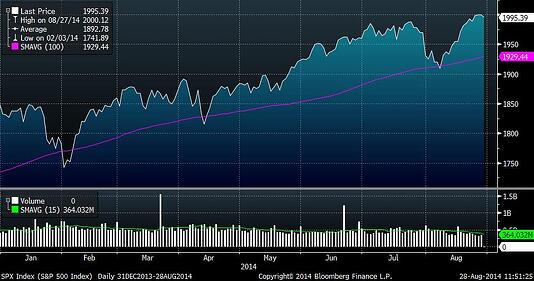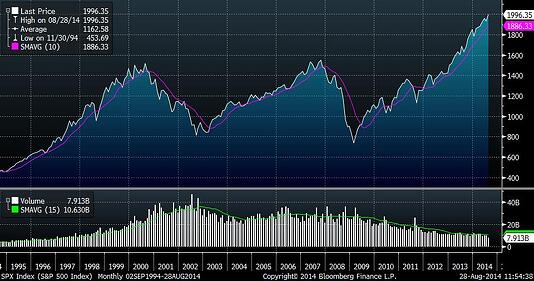 In the past couple of days, I’ve read several articles in the newspapers and in professional forums denouncing the notion of market timing. They say, quite correctly, that no one can time the market and call the ups and downs. Very true. They also say that various market timing tools won’t generate higher returns consistently. Again, very true. They conclude that it makes no sense to step back from the stock market occasionally to assess market conditions.
In the past couple of days, I’ve read several articles in the newspapers and in professional forums denouncing the notion of market timing. They say, quite correctly, that no one can time the market and call the ups and downs. Very true. They also say that various market timing tools won’t generate higher returns consistently. Again, very true. They conclude that it makes no sense to step back from the stock market occasionally to assess market conditions.
Let’s put this analysis in a different context, though, and see if that conclusion makes sense. Forget the stock market, let’s talk about the weather—specifically, hurricanes.
Are forecasts a waste of time?
It’s true that no one can predict hurricanes. We can’t determine when and where a storm will hit, or how strong it will be when it does. And there’s no way to avoid all hurricanes.
Is it, then, appropriate to conclude that attempting to forecast the weather is a waste of time? Are people who evacuate when a hurricane threatens, or spend money and time boarding up their homes, idiots? After all, they’re incurring costs and inconveniences that will be wasted if the hurricane doesn’t hit, much as the investor who revises his portfolio in fear of a correction will.
I think most people who live in Florida or New Orleans—or, for that matter, New Jersey—would agree that weather forecasting and storm warnings are not, in fact, a waste of time, despite their necessary imprecision and false alarms.
The reason hurricane warnings work is that they’re tied to the potential for severe damage. No one evacuates for a normal storm, and no one sells out for normal volatility. The issue arises when a big one comes rolling in, when evasive action might make sense even if the risk isn’t all that high.
Eyeing a tropical depression in the markets
In my posts over the past couple of days, we’ve identified warning signs that suggest the potential for a severe downturn in the markets. You can compare this to watching a tropical depression form down in the Caribbean. It might not escalate into a hurricane, but it makes sense to keep an eye on it.
We are now watching a tropical depression in the markets, waiting to see if it will be upgraded to tropical storm status—say, when a major market index cracks its 100-day moving average. You can see in the following chart that we’ve had three brief tropical storm events so far this year.

Storm warnings like this are worth watching, to see if they develop into something worse, but they’re no reason to panic.
What may warrant action is what I call a hurricane warning—when the market drops below the 10-month or 200-day moving average, as shown in the following chart.

You can see that, as with real hurricanes, there have been false alarms, where the market broke its 10-month moving average and then recovered. These warnings aren’t a reason to panic, but they do warrant evaluating the situation carefully.
Should you ignore the warnings?
Over the past 20 years, the market has broken through the 10-month moving average several times. There were false alarms in 1998 and 1999, as well as in 2010 and 2011. There were real alarms in 2000 and 2007. Out of six alarms, two-thirds were false. The anti-market timers are right—you can’t predict the market.
The flip side, of course, of a two-thirds chance of a false alarm is a one-third chance of a real alarm. When a hurricane comes roaring in, I don’t hear too many people urging residents to ride it out, since we don’t know for sure if the storm will hit. It’s important to think about the damage a real alarm could cause before you decide to ignore the warning.
Either way, you should decide whether or not to change your portfolio in exactly the same way you’d decide what to do with a hurricane approaching. Consider the potential damage, consider your location, consider your willingness and ability to rebuild, and compare that with the very real costs of evacuating. Then make an informed choice, not one driven by emotions.
The decision to stay put no matter what may end up being just as damaging to the investor as it would to the homeowner in a hurricane’s path.


 Print
Print


